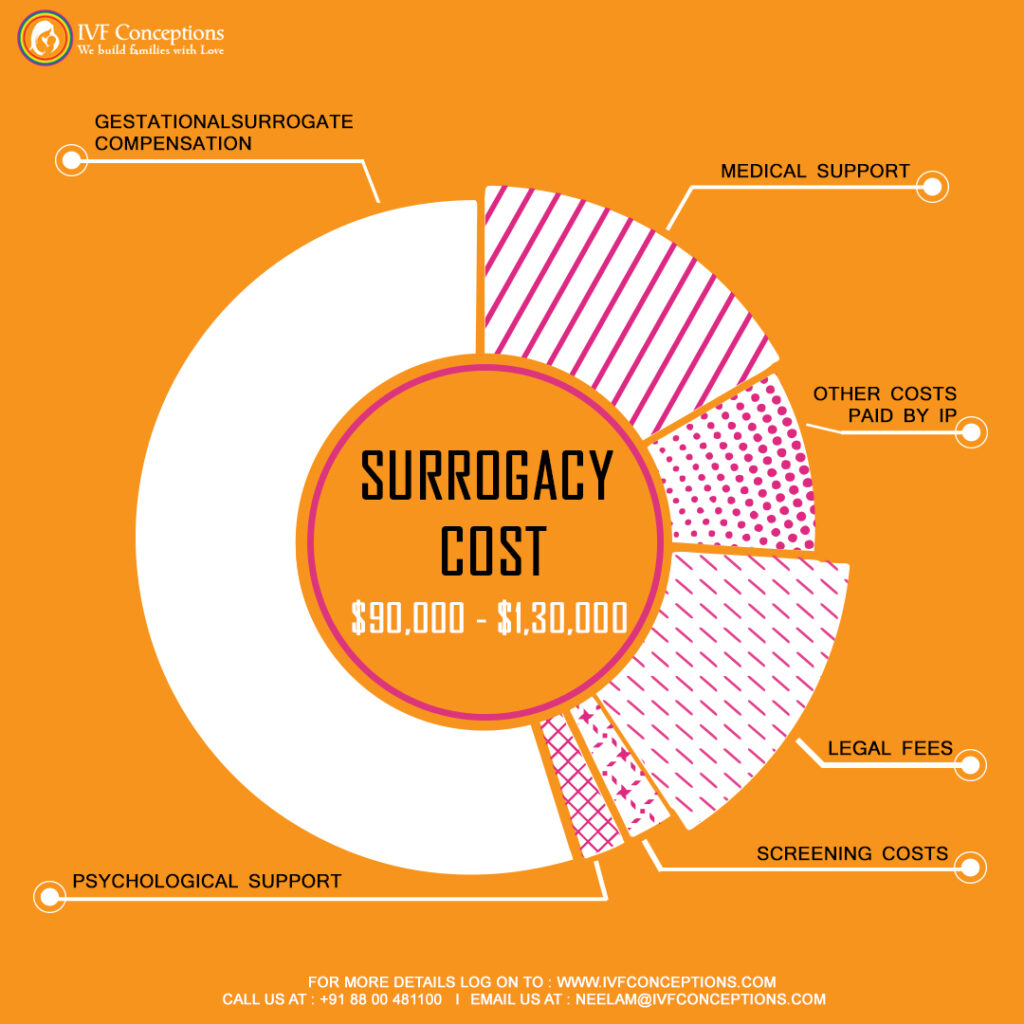Gestational Vs Traditional Surrogacy Explained

Gestational vs. Traditional Surrogacy Explained: Key Differences
The main difference between gestational and traditional surrogacy lies in the genetic connection between the surrogate and the baby. In gestational surrogacy, the embryo is created using the intended parents’ or donor gametes through IVF, meaning the surrogate mother has no biological link to the child—she is solely the gestational carrier.
On the other hand, in traditional surrogacy, the surrogate mother uses her own egg, making her genetically related to the baby. This method is less common due to legal and emotional complexities. Understanding the difference between gestational and traditional surrogacy is essential when choosing the right path for your surrogacy journey.
- Book an online appointment: Get a free online consultation.
- Call\W:+91-8800481100 Email:neelam@ivfconceptions.com
Did you know that gestational surrogacy is the more common type of surrogacy today, accounting for over 90% of all surrogacy arrangements? When considering surrogacy, prospective parents and potential surrogates are faced with the decision between gestational and traditional surrogacy. Understanding the differences between these two types is crucial when making this important choice.
More Resources to Read:
Infertility Treatment and Surrogacy Process
9 Factors To Improve IVF Pregnancy Rate
International Surrogacy Options Worldwide
Surrogacy Guide for Surrogate Mothers
In gestational surrogacy, also known as partial surrogacy or host surrogacy, the surrogate (known as the gestational carrier) is not biologically related to the baby she carries. Instead, the embryo is created through in vitro fertilization (IVF) using the intended parents’ or donor’s eggs and sperm. The embryo is then transferred to the gestational carrier’s uterus, where it develops until birth.
On the other hand, traditional surrogacy involves a surrogate who carries a child conceived using her own eggs and the intended father’s sperm. This method is less common today due to the potential legal and emotional complexities it may entail.
Key Takeaways:
- Gestational surrogacy accounts for over 90% of all surrogacy arrangements.
- In gestational surrogacy, the surrogate is not biologically related to the baby.
- Traditional surrogacy involves a surrogate who carries a child conceived using her own eggs.
If you’d like to learn more about IVF, Egg Donation, or surrogacy services globally, check out the rest of our website at Complete Surrogacy.
Contact us at 91-8800481100 ( WhatsApp, Line, Viber) or via email at neelam@ivfconceptions.com for more information.
Gestational Vs Traditional Surrogacy Main Difference

The main difference between gestational and traditional surrogacy lies in the surrogate’s biological connection to the child. This key distinction leads to several significant differences in the surrogacy process.
Medical Process
In gestational surrogacy, the intended parents or donors undergo in vitro fertilization (IVF) to create an embryo. The embryo is then transferred to the gestational carrier’s uterus. Since the gestational carrier is not biologically related to the child, she is simply providing a nurturing environment for the baby.
On the other hand, in traditional surrogacy, the surrogate’s own egg is fertilized with the intended father’s sperm through artificial insemination. This means that the traditional surrogate is genetically related to the child she carries.
Legal Process
Gestational surrogacy is generally more straightforward legally, as the gestational carrier has no genetic ties to the child. The intended parents typically establish their legal rights to the child through a surrogacy agreement and court processes.
Traditional surrogacy, however, can be more legally complex. The traditional surrogate may have parental rights to the child since she is genetically related. Therefore, legal arrangements must be made to ensure the intended parents have full legal rights and responsibilities.
Wait Time
The wait time for gestational surrogacy can vary depending on various factors, such as finding a suitable gestational carrier and the success of the IVF process. Generally, it may take several months to a year to find and match with a gestational carrier.
Traditional surrogacy may have a shorter wait time since it requires less extensive medical procedures. However, finding a traditional surrogate who is willing to carry a child and navigate the legal complexities can still take time.
Costs

Gestational surrogacy is often more expensive than traditional surrogacy due to the additional medical procedures involved, such as IVF. The costs can include fertility treatments, legal fees, compensation for the gestational carrier, and agency fees.
Traditional surrogacy may have lower medical costs since it does not involve IVF. However, legal fees and compensation for the surrogate can still be significant.
Risks
Gestational surrogacy generally carries fewer emotional risks for the surrogate since she is not genetically related to the child. However, there can still be emotional and psychological challenges throughout the process for all parties involved.
Traditional surrogacy can come with additional emotional risks, as the surrogate has a genetic connection to the child. This can lead to potential complications and complexities in the surrogacy relationship.
| Gestational Surrogacy | Traditional Surrogacy | |
| Biological Connection | No | Yes |
| Medical Process | In vitro fertilization (IVF) | Artificial insemination |
| Legal Process | Establishing parental rights through surrogacy agreement and court processes | Additional legal complexities due to genetic connection |
| Wait Time | Several months to a year | Potentially shorter |
| Costs | Generally higher due to IVF | Potentially lower medical costs, but significant legal and compensation expenses |
| Risks | Less emotional risks for the surrogate | Potential emotional complexities due to genetic connection |
Gestational Vs Traditional Surrogacy Cost Explained
When considering surrogacy, one of the important factors for intended parents to consider is the cost. The cost of surrogacy can vary significantly depending on several factors, including the type of surrogacy chosen. Let’s explore the cost differences between gestational and traditional surrogacy.
Gestational Surrogacy Cost:
In gestational surrogacy, the surrogate, also known as the gestational carrier, is not biologically related to the baby she carries. Instead, the embryo is created through in vitro fertilization (IVF) using the intended parents’ or donor’s eggs and sperm. This process involves additional medical procedures, such as egg retrieval and embryo transfer, which contribute to the overall cost of gestational surrogacy.
Gestational surrogacy generally involves the following costs:
- Medical expenses, including IVF procedures and prenatal care for the gestational carrier.
- Legal fees for drafting and reviewing surrogacy contracts, ensuring that the intended parents‘ parental rights are protected.
- Agency fees, if the intended parents choose to work with a surrogacy agency to facilitate the matching process and provide support throughout the surrogacy journey.
- Compensation for the gestational carrier, which typically includes base compensation, medical expenses, and other allowances.
The average cost of gestational surrogacy can range from $100,000 to $150,000, but it’s important to note that this is just a general estimate. The actual gestational surrogacy cost may vary depending on various factors including location, agency fees, legal fees, and individual arrangements.
Traditional Surrogacy Cost:

In contrast, traditional surrogacy involves the surrogate using her own eggs to conceive the child. This eliminates the need for expensive IVF procedures, resulting in lower overall costs compared to gestational surrogacy.
Traditional surrogacy costs typically include:
- Medical expenses, including fertility treatments and prenatal care for the surrogate.
- Legal fees for establishing parental rights and addressing the legal aspects of traditional surrogacy.
- Compensation for the surrogate, which may include base compensation, medical expenses, and other allowances.
The average cost of traditional surrogacy can range from $60,000 to $90,000, again, taking into account variables such as location, legal fees, agency fees (if applicable), and individual arrangements.
Here’s a table comparing the costs of gestational surrogacy and traditional surrogacy:
| Cost Category | Gestational Surrogacy | Traditional Surrogacy |
|---|---|---|
| Surrogacy Agency Fees | Higher | Lower |
| Surrogate Compensation | Higher | Lower |
| Medical Expenses | Similar | Similar |
| Legal Fees | Similar | Similar |
| Psychological Support | Recommended | Recommended |
| Insurance | Similar | Similar |
| Total Cost Range | $80,000 – $150,000+ | $60,000 – $100,000+ |
Please note that these costs are approximate ranges and can vary depending on various factors such as location, individual circumstances, medical requirements, and legal fees. It’s essential for intended parents to conduct thorough research and consult with professionals in the field to get a more accurate estimate of the costs involved in both gestational and traditional surrogacy.
Gestational Vs Traditional Surrogacy : Pros and Cons
When weighing the options of gestational surrogacy and traditional surrogacy, it’s important to consider the pros and cons associated with each method. Prospective parents and surrogates should carefully evaluate these factors to make an informed decision that suits their individual circumstances.
Pros of Gestational Surrogacy
Gestational surrogacy offers several advantages:
- The surrogate (known as the gestational carrier) is not biologically related to the baby, reducing potential emotional and legal complications surrounding parental rights and surrogate mother rights.
- Intended parents have the opportunity to have a genetic connection to the child through the use of in vitro fertilization (IVF) using their own eggs and sperm or through the use of a donor.
- Gestational surrogacy allows for a safer pregnancy for the surrogate, as she does not have to undergo the medical risks associated with traditional surrogacy.
- Surrogacy agreements are typically more straightforward, as there is no potential for a biological connection between the surrogate and the child.
Cons of Gestational Surrogacy
While gestational surrogacy has its benefits, there are also potential drawbacks to consider:
- Gestational surrogacy tends to be more expensive than traditional surrogacy due to the additional medical procedures involved, including IVF.
- Legal issues surrounding gestational surrogacy can arise, particularly related to surrogacy agreements and parental rights in surrogacy.
- Ethical concerns may come into play, as some argue that gestational surrogacy commodifies the reproductive process.
Pros of Traditional Surrogacy
Traditional surrogacy has its own unique advantages:
- Traditional surrogacy typically comes with lower costs compared to gestational surrogacy, as it does not involve advanced medical procedures.
- There is a potential for a biological connection between the surrogate and the child, which some intended parents may desire.
- Surrogacy agreements and legal issues may be simpler, as the biological connection between the surrogate and the child is established.
Cons of Traditional Surrogacy
However, traditional surrogacy also presents certain challenges:
- Emotional and legal complexities can arise due to the biological connection between the surrogate and the child, potentially leading to parental rights disputes.
- Surrogate mother rights might be more complicated to navigate, as the surrogate has a genetic link to the child.
- Traditional surrogacy carries greater medical risks for the surrogate, as she will undergo pregnancy and childbirth.
| Gestational Surrogacy Pros | Gestational Surrogacy Cons | Traditional Surrogacy Pros | Traditional Surrogacy Cons |
| The gestational carrier is not biologically related to the baby | Higher costs due to additional medical procedures | Potential for a biological connection between the surrogate and the child | Biological connection can lead to emotional and legal complexities |
| Opportunity for intended parents to have a genetic connection to the child through IVF | Legal issues surrounding surrogacy agreements and parental rights | Lower costs compared to gestational surrogacy | Risks and complexities related to surrogate mother rights |
| A safer pregnancy for the surrogate | Ethical concerns regarding commodification of reproduction | Less complex surrogacy agreements and legal issues | Medical risks for the surrogate |
If you’d like to learn more about gestational and traditional surrogacy, surrogacy agreements, surrogate mother rights, and other legal issues surrounding surrogacy, contact Complete Surrogacy at 91-8800481100 (WhatsApp, Line, Viber) or email neelam@ivfconceptions.com. Visit our websites: www.ivfconceptions.com and www.completesurrogacy.com.

Which surrogacy option is best for you: Gestational Vs Traditional Surrogacy
Choosing the right surrogacy option is a deeply personal decision that depends on various factors specific to your needs and preferences as intended parents. When considering your options, it’s essential to take into account several important considerations.
The first consideration is the desired genetic connection to the child. If maintaining a genetic link is important to you, gestational surrogacy may be the best choice. In gestational surrogacy, the surrogate, known as a gestational carrier, is not biologically related to the baby. Instead, the embryo is created through in vitro fertilization (IVF) using your or a donor’s eggs and sperm. This allows for a genetic connection to the child while the gestational carrier provides the nurturing environment for the pregnancy.
Another important factor to consider is the emotional and legal risks involved. Both gestational and traditional surrogacy come with emotional complexities and potential legal hurdles. It’s crucial to have a thorough understanding of the emotional toll surrogacy can have on all parties involved and seek proper legal counsel to protect your interests and ensure a smooth process.
Additionally, you should consider the medical procedures, wait times, and costs associated with each surrogacy option. Gestational surrogacy generally involves more medical procedures, making it a more complex and potentially costly process. Traditional surrogacy may have shorter wait times and lower costs, but it is important to be aware of the legal requirements and limitations surrounding traditional surrogacy in your location.
More Resources to Read:
Surrogacy Guide for Surrogate Mothers
Surrogacy Guide for Intended Parents
How does the surrogacy process work
Conclusion
Ultimately, finding the best surrogacy option for you will depend on a careful evaluation of these factors and seeking guidance from experienced surrogacy professionals. If you’d like to learn more about IVF, Egg Donation, or surrogacy services, you can visit the websites of Complete Surrogacy and IVF Conceptions. They offer a wealth of information and can assist you in making the right decision for your surrogacy journey.
If you’d like to learn more about IVF, Egg Donation, or surrogacy services globally, check out the rest of our website at Complete Surrogacy Agency. We offer legally secure and affordable surrogacy consulting services for FREE.
For more resources on IVF and Surrogacy, browse our other web page- IVF Conceptions.
For more resources on IVF and Surrogacy, browse our other web page- Georgia Surrogacy Agency.
Complete Surrogacy: Your Trusted Partner in International Surrogacy
At Complete Surrogacy, we have over 15 years of experience in international surrogacy, guiding 4,000+ intended parents worldwide. We provide safe, ethical, and affordable surrogacy solutions for single parents, LGBTQ+ couples, and heterosexual couples.
As members of EFS and ESHRE, we adhere to the highest ethical and professional standards. Our expert team is committed to providing accurate, compassionate, and transparent guidance, ensuring a legally secure and smooth journey to parenthood.
Let us help you build your family with trust, care, and integrity.
Get in touch for one FREE Surrogacy Consultancy!

FAQ for Gestational Vs Traditional Surrogacy
What is the main difference between gestational and traditional surrogacy?
The main difference between gestational and traditional surrogacy lies in the surrogate’s biological connection to the child. In gestational surrogacy, the surrogate is not biologically related to the baby she carries, while in traditional surrogacy, the surrogate is genetically related to the child.
What is the surrogacy process for gestational surrogacy?
In gestational surrogacy, the intended parents or donors’ eggs and sperm are used to create an embryo through in vitro fertilization (IVF). The embryo is then transferred to the gestational carrier’s uterus, who carries the baby to term.
What is the surrogacy process for traditional surrogacy?
In traditional surrogacy, the surrogate mother’s eggs are used, either through artificial insemination or IVF, to conceive the child. The surrogate mother carries the baby and gives birth, with the intention of giving the child to the intended parents.
What are the legal aspects of gestational and traditional surrogacy?
The legal aspects of surrogacy vary by jurisdiction. However, gestational surrogacy tends to have clearer legal implications, as the gestational carrier is not genetically related to the child. Traditional surrogacy can pose more legal challenges, as the surrogate mother may have legal parental rights.
How much does gestational surrogacy cost?
The cost of gestational surrogacy varies depending on several factors, including the country or state, the surrogacy agency fees, medical procedures, and compensation for the gestational carrier. On average, gestational surrogacy can range from $80,000 to $150,000 or more.
How much does traditional surrogacy cost?
The cost of traditional surrogacy can also vary, but it is generally less expensive than gestational surrogacy. The costs typically include fertility treatments, legal fees, and compensation for the surrogate mother. It can range from $60,000 to $100,000 or more.
What are the pros and cons of gestational surrogacy?
Some pros of gestational surrogacy include a lower risk of legal complications, a genetic connection to the child, and the possibility of using donor eggs or sperm. However, cons may include higher costs, the need for IVF, and potential emotional challenges for the intended parents and gestational carrier.
What are the pros and cons of traditional surrogacy?
Pros of traditional surrogacy may include lower costs, a natural conception process, and potential emotional bonding between the surrogate mother and the intended parents. However, cons may include legal complexities, the surrogate mother’s potential legal parental rights, and the lack of a genetic connection for the intended parents.
Which surrogacy option is best for me?
The choice between gestational and traditional surrogacy depends on your specific needs and preferences. Factors to consider include the desired genetic connection to the child, emotional and legal risks, medical procedures, wait times, costs, and the availability of experienced professionals in the chosen type of surrogacy.

Author Bio: Neelam Chhagani is an International Surrogacy Expert with 15 years of experience in the fertility and surrogacy domain. As the founder of IVF Conceptions and Complete Surrogacy, she has guided over 4,000 intended parents worldwide on their surrogacy journey to parenthood. Recognized as a trusted authority, she specializes in holistic infertility solutions and third-party reproduction consulting.
Holding an MA in Counselling Psychology and a PGD in Mental Health, Neelam is a proud member of the European Fertility Society (EFS) and the European Society of Human Reproduction and Embryology (ESHRE). She is also a leading surrogacy blogger, providing valuable insights into ethical and practical surrogacy solutions.
Since 2010, committed to supporting ALL family types, Neelam has been passionate about helping intended parents grow their families with compassion, integrity, and a focus on secure and affordable surrogacy options Globally.
Learn more about Neelam:
https://www.ivfconceptions.com/neelam-chhagani-surrogacy-consultant/
https://www.linkedin.com/in/neelam-chhagani-92892229/















I was introduced to Neelam by a friend who worked with Neelam for surrogacy. Neelam is absolutely wonderful. I am a single male and the journey to fatherhood is not that easy. Neelam connected me to a program ideal for my circumstances. She was with me throughout the pregnancy providing advice and guidance along the way. I am so grateful I found her and am thrilled today that I have a beautiful daughter. I highly recommend Neelam to anyone who is on a journey to become a parent. Having a child has changed my world for the better. I wish others success with their own journey and recommend you connect with Neelam to find a path that is best for you.
SA (USA)